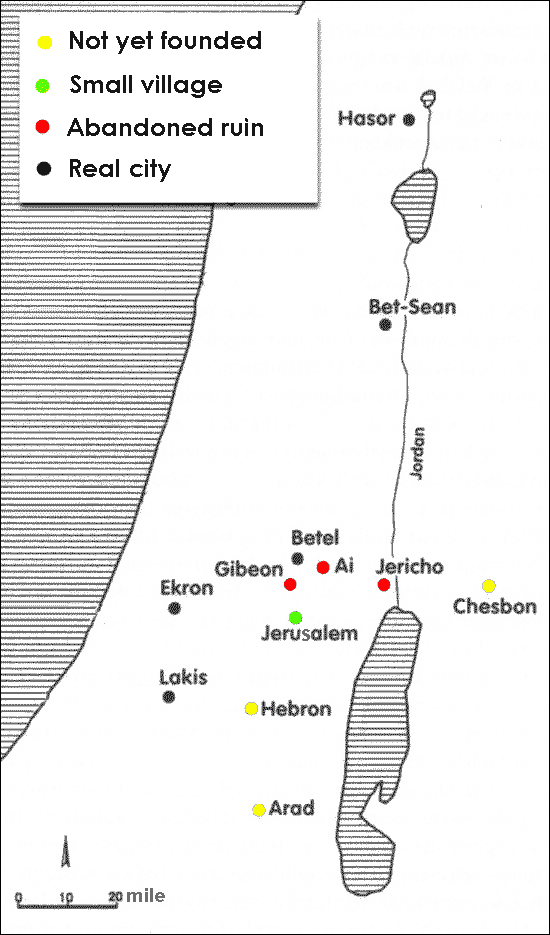After forty years in the desert, the Israelites led by Joshua conquered Canaan, city by city
(Joshua, Judges)
![]()
![]()
![]()
![]()
![]()
Many of the places mentioned in the Book of Joshua simply didn’t exist back then. Cities like Jericho, Gibeon and Ai were abandoned ruins; others like Heshbon and Kadesh Barnea were not yet founded.
Besides, Joshua would have stumbled upon a very different people: the Egyptians. At the time of the Canaanite invasion, Canaan was an Egyptian province. But in the bible, not a word about Egyptians. And that goes two ways: the detailed Egyptian reports from Canaan don't mention any invasion.
What's more, archaeology and DNA-research has proved that the Israelites didn't come from abroad!
In reality, they were nomadic shepherds who settled down in the mountainous middle region of Israel. The Israelites were Canaanites themselves!
![]()
Before going into more detail, here's an overview of the basic arguments against the invasion of Canaan as the bible describes:
|
||
|
||
|
||
|
Medical |
|
|
![]()
![]()
Joshua tells us that a band of no more than some 60,000 untrained, desert-dwelling ex-slaves suddenly turn out a very powerful army.
How do they stand a chance against the highly trained, heavily armed military forces of Jericho, Ai, Megiddo, Hazor or Gibeon? Where did they get their weapons from? What about the children, women and elderly among the Israelites?
What's more, the bible contradicts itself.
There are two different conquest stories in the bible: one in the Book of Joshua, and one in Judges 1. Oddly, they are completely different.
In Joshua, we read how Joshua conquers all of Canaan in a swift, miracle-laden military campaign. And in Judges, we read how the tribe of Juda conquers parts of Canaan and leaves other parts to the Canaanites.
Cities like Hebron and Hormah are conquered two times; Jerusalem is in one verse destroyed, while in another, it is saved.
Most modern bible researchers believe the version of Judges was there first, and that the more 'sensational' version of Joshua (with its crumbling walls of Jericho, stopping sun and all that) was written much later.
![]()
![]()
In the 13th century BC, Canaan was a very different place than the bible wants us to believe. It was a quiet, rather dull, rural province of the Egyptian empire. The Egyptians ran the place: they had some armies there and civil servants who recorded everything that happened.
And a dull place it was, archaeologists have shown. Biblical cities like Jericho, Megiddo, Hazor and Lachish were in reality simple, small towns. And the ‘kings’ who ruled them were in real life insignificant, small-time local leaders. The real people in power were the Egyptians!
A lovely example of how daily life really went about in rural Canaan is found on a clay tablet from ca. 1350-1330 BC. On it, the ‘king’ of Jerusalem asks the Egyptians for military support to protect the land. He needs fifty soldiers. Fifty soldiers to protect the land!
Importantly, the Egyptians recorded every little thing that went on in Canaan.
Surely, they would have wrote something about it if an alien army suddenly stormed in from the desert, stopped the river Jordan, destroyed Jericho, Hazor Lachish, Ai and Megiddo, ruthlessly butchered every inhabitant they met and mercilessly executed all local leaders?
But the Egyptian papyruses and incriptions mention absolutely nothing at all about such events. Not a word.
The other way around, the Book of Joshua strangely doesn’t mention the Egyptians. If Joshua really invaded Canaan, any military resistance he would have met would have come from the Egyptians, not from the local ‘kings’. But the bible doesn’t mention any of this.
![]()
Still, there is evidence the Israelites were indeed present in Canaan around the year 1210 BC!
Back then, pharaoh Merneptah (1212-1202 BC) held a military campaign in Canaan. And on a memorial stone (a ‘stele’) Merneptah boasts that he crushed a number of people, among others… the Israelites!
“Israel is laid waste, its seed is not [there anymore]”, the pharaoh cosily remarks. It’s the very first, oldest non-biblical mention of the people of Israel.
But it wasn’t exactly that the Israelites had just conquered Canaan. They were just one of many peoples on the block: Merneptah offers us a looooong list of people he had to fight in Canaan.
![]()
![]()
Archaeology: the real Israelites
 |
When archaeologists started digging for places like Jericho and Ai, what they found at first looked like evidence favoring the Book of Joshua. Amazingly, cities like Debir, Betel, Lachish and Hazor indeed were destroyed around the 13th century BC. They were burnt down, and then inhabited by new settlers. But as the search went on, more and more evidence surfaced that disproved the biblical version of things. For example, cities like Jericho, Gibeon and Ai were uninhabited in the 13th century. They were deserted ghost towns! |
|
|
The same goes for many other places Joshua is said to have conquered: Kefira, Beërot, Kirjat-Jearim, Heshbon and Arad. They simply didn’t exist back then. Also, the cities that were destroyed, weren’t destroyed in one military campaign. As researchers looked more closely, they found that the cities were destroyed over a period of at least a century. By now, archaeologists agree that there is zero evidence supporting a massive Israelite invasion. The destruction of Hazor, Betel, Lachish and Debit had a very different cause. Around the 13th century BC, unrest broke out throughout the Middle East. Its causes were manifold: invasions from so-called Sea Peoples, famines, and more generally, the decline of the old Bronze Age Empires. Local farmers would have turned against their vassal cities and pillaged them. Hungry local rioters must have looted and burnt down Hazor and Lachish, not Joshua and his Israelites.
Finkelstein and Silberman: "The bible unearthed" (2003) William Stiebing: "Out of the desert? Archaeology and the exodus" (1989) |
||